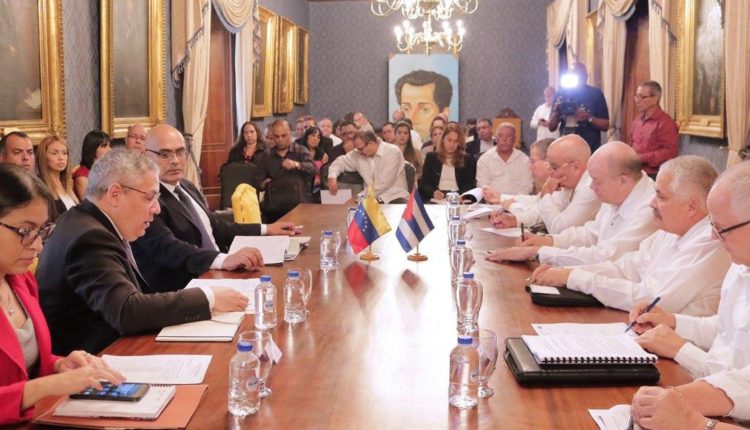
Venezuela strengthens Cuba, China and Iran ties following Guatemala row
By Paul Dobson / Venezuelanalysis
MERIDA, January 20, 2020 – Venezuela has signed a number of bilateral agreements as part of efforts to counter the Washington-led blockade.
The 20th Cuba-Venezuela Intergovernmental Commission was held in Caracas on Thursday and Friday, approving a series of new joint projects in sport, culture, energy, telecommunications, economy, and agriculture. According to official sources, the two countries have now signed over 1,400 agreements since 2000.
The 2020 plan also looks to strengthen joint health projects, which have reportedly benefited more than 2 billion Venezuelans and trained over 26,000 Venezuelan doctors.
This year, efforts will reportedly focus on guaranteeing the supply of medicines to the Cuban-led Barrio Adentro social program. In addition, 12 new joint ophthalmological and dental care projects are to be set up.
Delegations at the summit were led by Venezuelan Economy Vice President Tareck El Aissami and Cuban Council of Ministers Vice President Ricardo Cabrisas.
El Aissami stressed the need for efficiency in implementing social programs, stating that “today we must do more with less.”
Similarly, Cabrisas drew parallels between the economic blockades set up against both nations, claiming they would not be victorious.
“[Cuban-Venezuelan relations] show that anything is possible when humanism (…) is prioritised over mercantile relations,” the Cuban official declared from Caracas.
An executive order from the Trump administration in August imposed a blanket ban on all dealings with the Venezuelan state and authorised sanctions against any third party firms trading with Caracas. The measures escalated previous sanctions which targeted specific Venezuelan industries and individuals. NGO’s and the United Nations have denounced the social impact of the unilateral coercive measures, while the Venezuelan government has claimed the measures have caused problems in processing international payments and importing medicine to the country.
Visits to China and Iran
As part of efforts to strengthen bilateral ties, Venezuela’s Foreign Minister Jorge Arreaza has visited China and Iran in recent days.
Arreaza met his Iranian counterpart Javad Zarifto to coordinate efforts to “defend and strengthen” international law, the UN Charter, and multilateralism.
Like Venezuela, Iran has also been increasingly affected by US sanctions in recent years. The two countries are part of the Organisation of Oil-Producing Countries (OPEC), the Non-Aligned Movement, and a UN group of sanction-hit countries, and have seen relations strengthen in recent years.
Arreaza’s visit to the Middle East follows an extensive trip to China last week, where he met with Vice President Wang Qishan, Foreign Minister Wang Yi and the head of the Chinese Communist Party’s international department, Song Tao, amongst others.
While few details were released, it is understood that political and economic ties were reaffirmed, with the countries due to meet in Caracas later this year in the XVIII Mixed Commission Summit.
“The China-Venezuela relationship is unbreakable, resilient, and capable of adapting itself,” Arreaza told reporters upon arriving in Beijing.
“China has never looked to impose conditions on Venezuela (…) We are sure that with the support of China (…) we will recover the economy from the savage and criminal attacks to which it has been subjected in recent years,” he added.
From Beijing, Arreaza also indicated that his government is “preparing” to join China’s flagship Silk Road program, calling it “a proposal of development, shared profits, of peace.”
Doubts remain, however, about the status of Venezuela’s involvement in the multibillion dollar project, with other government spokespersons claiming the country has already joined it, without offering further details.
Guatemala breaks relations
In contrast with the strengthened ties with its allies, Venezuela suffered a diplomatic rupture with Guatemala last week. The Central American nation is withdrawing all diplomatic staff and closing its Caracas embassy.
The move follows an October spat when then president-elect Alejandro Giammattei was denied entrance to Venezuela. At the time, Caracas authorities claimed that he did not possess an official invitation or credentials and did not comply with other visa requirements.
“We definitively end relations with the government of Venezuela,” the conservative president told press in Guatemala City Thursday, two days after taking office.
In response to the breakdown of diplomatic ties, Venezuela’s Foreign Minister Jorge Arreaza accused the Guatemalan president of “immediately throwing himself at the feet of Donald Trump.”
Guatemala joined the United States and other regional allies in recognising self-declared “Interim President” and former National Assembly President Juan Guaido as Venezuela’s leader in place of President Nicolas Maduro. It is unclear at the time of writing whether Caracas will take reciprocal diplomatic measures against Guatemala.

